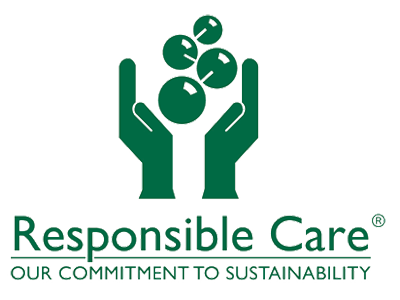Responsible Care
Chemistry is an integral part of our daily lives. Its development is a prerequisite for the progress of man and community. However, all economic activities have an impact on the environment.
Responsible Care is a philosophy that endorses the principle of ecologically responsible development. It is
- a guideline throughout the entire business operations.
- a commitment to responsible and careful management.
The distribution of chemical products can only become safer if all those involved work together.

The BACD Belgian Association of Chemical Distributors fully recognizes the policy principles of the Responsible Care philosophy. In doing so, all members endorse the commitment to make every effort to continuously improve performance in terms of safety, health protection and the environment.
The Responsible Care program is applied worldwide. In Europe, CEFIC and FECC, and in Belgium, essenscia monitor the programme. The BACD has entered a commitment with essenscia to take over the Responsible Care Program, as proposed by essenscia, in its entirety.
BACD Responsible Care Certificate.
Members of the BACD who fully incorporate the principles of the European Responsible Care program and apply them in their business philosophy can obtain the BACD Responsible Care Certificate.
The Responsible Care program consists of five steps that every member of our association must follow:
- A commitment by the management of the company to apply the 8 basic rules.
- Appointing a Responsible Care Coordinator, RCC, within society.
- Evaluate at regular intervals the way in which the RC basic rules are followed and applied in the company. This evaluation is externally audited every three years: Third Party Verification, TPV.
- To submit the company's Indices of Performance (IoP) questionnaire to the BACD once a year, based on which statistics can be drawn up to measure the efforts of industry and distribution.
- Have a program to implement improvements.
BACD recommends SQAS Distributors/ ESAD as a type of evaluation, as this type of assessment is also published and accessible to all actors in the industry. The triennial audits are carried out by SQAS accredited Assessors.
For smaller companies, CEFIC provides an online "European Responsible Care Self-assessment Tool", which our members can access. The integration with industry standards such as ISO 9001, ISO 14001, ISO 450001 contributes to the rapid completion of the questionnaire and the verification of the questionnaire by your ISO 9001 auditor.
EIGHT BASIC PRINCIPLES
Members of the BACD are committed to respecting the following basic principles of Responsible Care:
- Legal requirements.
Act in accordance with all legal regulations and relevant codes of conduct.
ISO 9001: Par. 5.1.a
- Risk management.
To make every effort to ensure that the company's activities do not entail unnecessary risks for employees, customers, society, or the environment.
ISO 9001: Par. 7.5.
- Policies and Documentation.
Maintain written documentation of the company's operations and ensure that health, safety and environmental policies meet the requirements of the Responsible Care program and are an integral part of the company's strategy.
ISO 9001: Par. 5.3. and 4.2.
- Product Information.
Provide relevant health, safety and environmental information on products and activities to employees, customers, and the public.
ISO 9001: Par. 5.1. – 7.2. – 7.4. and 7.5.
- Education - Training.
Do everything possible to ensure that all employees are aware of their commitment to Responsible Care and provide the necessary training to achieve the health, safety and environmental objectives.
ISO 9001: Par. 6.
- Contingency plan.
Establish and maintain contingency plans.
ISO 9001: Par. 7.5.3. – 8.5.2. and 8.5.3.
- Continuous improvements.
Strive to support those activities that improve the quality of one's own business and to support the awareness of all stakeholders regarding health, safety and the environment in business operations.
ISO 9001: Par. 8.5. and 5.6.
- Communication.
Keeping the community informed of the company's activities and responding to any concerns.
ISO 9001: Par. 5.5.3. – 7.2.3. and 7.4. .
RC Documents
- Triptych Code good practice bulk deliveries liquid chemicals (incl. Checklist Tank installations
- Interactive Inquiry form Code good practice bulk deliveries: first delivery
- Questionnaire IoP
- Responsible Care Q&A Cefic
- Appointment Responsible Care Coördinator
- CEO Commitment Responsible Care
- Responsible Care® Global Charter
- code good practice: Packaged goods
- Code good practice bulk deliveries: Guideline couplings
- code good practice: load securing when packaging is returned


